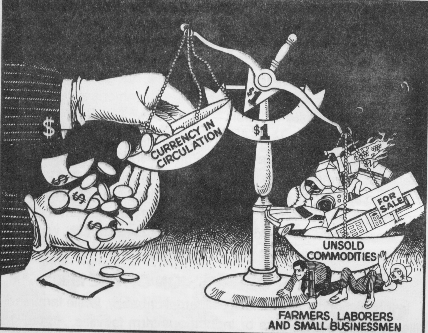Bankers' Depression of the 1930's.
In
1930 America did not lack industrial capacity, fertile farmlands,
skilled and willing workers or industrious families. It had
an extensive and efficient
transportation system in railroads, road networks, and inland and ocean waterways.
Communications between regions and localities were the best in the world, utilizing
telephone, teletype, radio, and a well operated government mail system.
No war had ravaged the cities or the countryside, no pestilence weakened the
population, nor had famine stalked the land. The United States of America in
1930 lacked only one thing: an adequate supply of money to carry on trade and
commerce.
In the early 1930s, bankers, the only source of new money and credit, deliberately
refused loans to industries, stores and farms. Payments on existing loans were
required however, and money rapidly disappeared from circulation. Goods were
available to be purchased, jobs waiting to be done, but the lack of money brought
the nation to a standstill.

By this simple ploy America was put in
a "depression" and
bankers took possession of hundreds of thousands of farms, homes,
and business properties. The people were told, "times are hard" and "money
is short." Not understanding the system, they were cruelly robbed
of their earnings, their savings, and their property.
CONTINUE
TO THE NEXT CHAPTER

RETURN
TO THE CONTENTS PAGE

